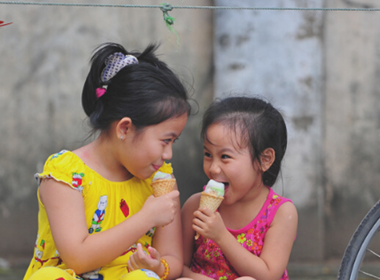To continue on with our series on good manners in Asia, we invite you to learn a little more about Vietnam, whose rich history continues to shape the traditions and good manners of the Vietnamese people.
To know the Vietnamese etiquette, first of all, one must remember that humility, self-control and modesty are the fundamental values of the Vietnamese people.
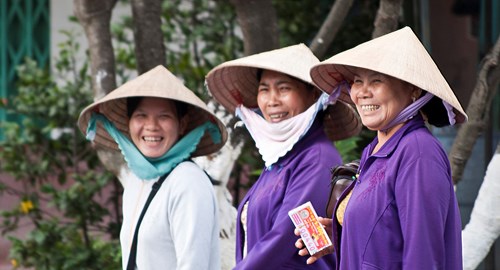
Greeting each other
As with all destinations, it is important to greet the people you meet verbally. “Xin chào” (pronounced sin chow) is the appropriate formal greeting to foreigners.
The handshake is the most common greeting. Some Vietnamese use a two-handed handshake, with the left hand resting on the right wrist.
The traditional greeting consists of pressing the hands in front of the body and bowing slightly, but this method is a bit old-fashioned and is only practiced in formal situations. In most cases, a bow is sufficient.
Always take off your shoes when you enter someone’s home.
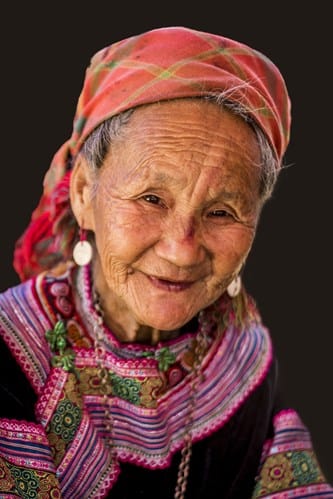
Respect for the elderly people
Vietnamese culture has great respect for the elderly people. In every situation, it is best to honor and give preference to the oldest member of the group.
Out of respect for the elderly or other esteemed people, such as the monks, you should take off your hat and politely bow your head when addressing them.
During the meal
As in all cultures, the meal is a very important moment in Vietnam and there are few rules to know, so as not to show impoliteness.
Again to show your respect for the elderly people, as in many Asian countries, it is customary to wait for the oldest person to start the meal first.
The chopsticks should generally be placed on top of the bowl. Do not place the chopsticks vertically straight up on a bowl of rice. It is considered disrespectful in Vietnam, as it looks like incense sticks on an altar, which is observed only for worshiping the ancestors and therefore, reserved for the dead people. Also, never tap the chopsticks on the rim of the bowl. This means bringing bad luck and poverty to the family.
Do not point the chopsticks at anyone as it is very impolite.
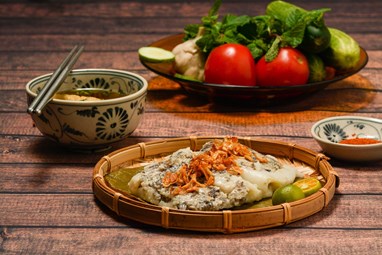
Equal sharing
During the meal, be sure to pass the bowl to the others with both hands. Also, don’t eat directly from the shared centre dish. Remember to put the food in your bowl first before eating it.
In Vietnam, when you take the food from shared dishes, it is also impolite to rummage through the dish for good portions, such as chicken legs and wings. This act is considered selfish, which is not appreciated in a socialist culture like Vietnam.
Turning the fish dish over is considered an unfortunate sign, which resembles the image of the boat turning over. This rule is taken very seriously in the coastal regions of Vietnam.
And of course don’t forget to say “Cam on” (meaning “Thank you”) to the host after the meal.
In the temples
To enter a Buddhist temple as in most religious places, you must dress conservatively (avoid shorts, skirts, low neckline, sleeveless, etc…), this also applies to the State institutions. You will not necessarily be criticized verbally if you arrive in this kind of clothing, but it is not advisable.
You must speak in a low tone of voice and avoid touching the objects of worship. It is also important not to point your feet towards a sacred object, such as an image of Buddha or an altar.
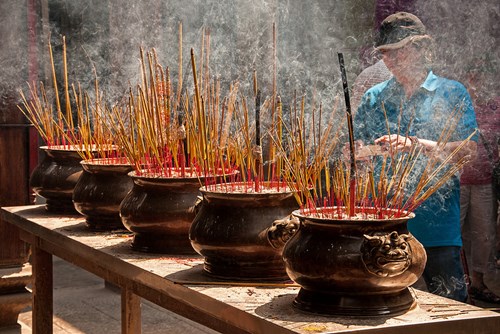
Some behaviours to avoid
Public displays of affection are generally not appreciated, so try to avoid touching people, especially those of the opposite sex.
The head is considered the most sacred part of the body, so don’t touch anyone on the head, including the children.
Avoid bragging or showing off your wealth
Sine the Vietnamese people value humility, avoid being boastful or showing off your wealth.
All these rules of the Vietnamese good manners are to be taken with “tweezers”. Behaviour can change, depending on the region and city. In big cities, the environment is relax. People are more open-minded and used to travelers. In any case, you can make up for it by trying a few words of Vietnamese and with a “sorry” smile.
So take a deep breath and enjoy!



